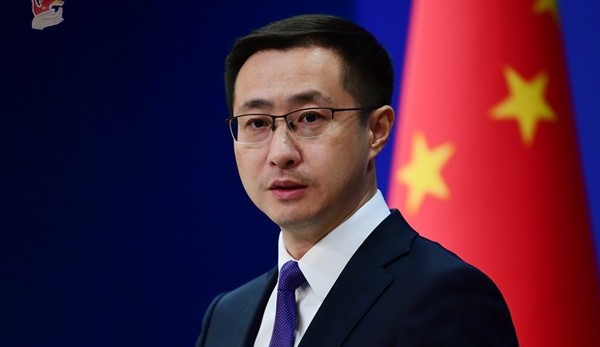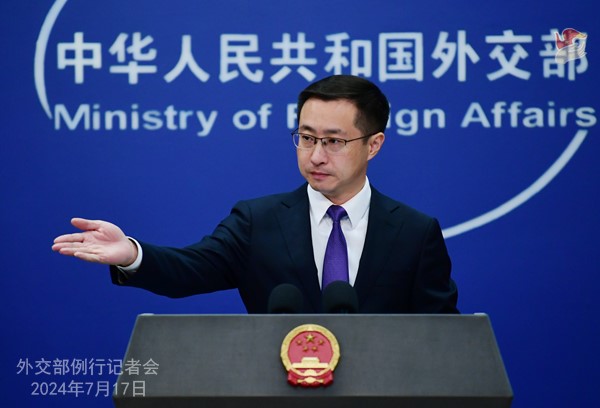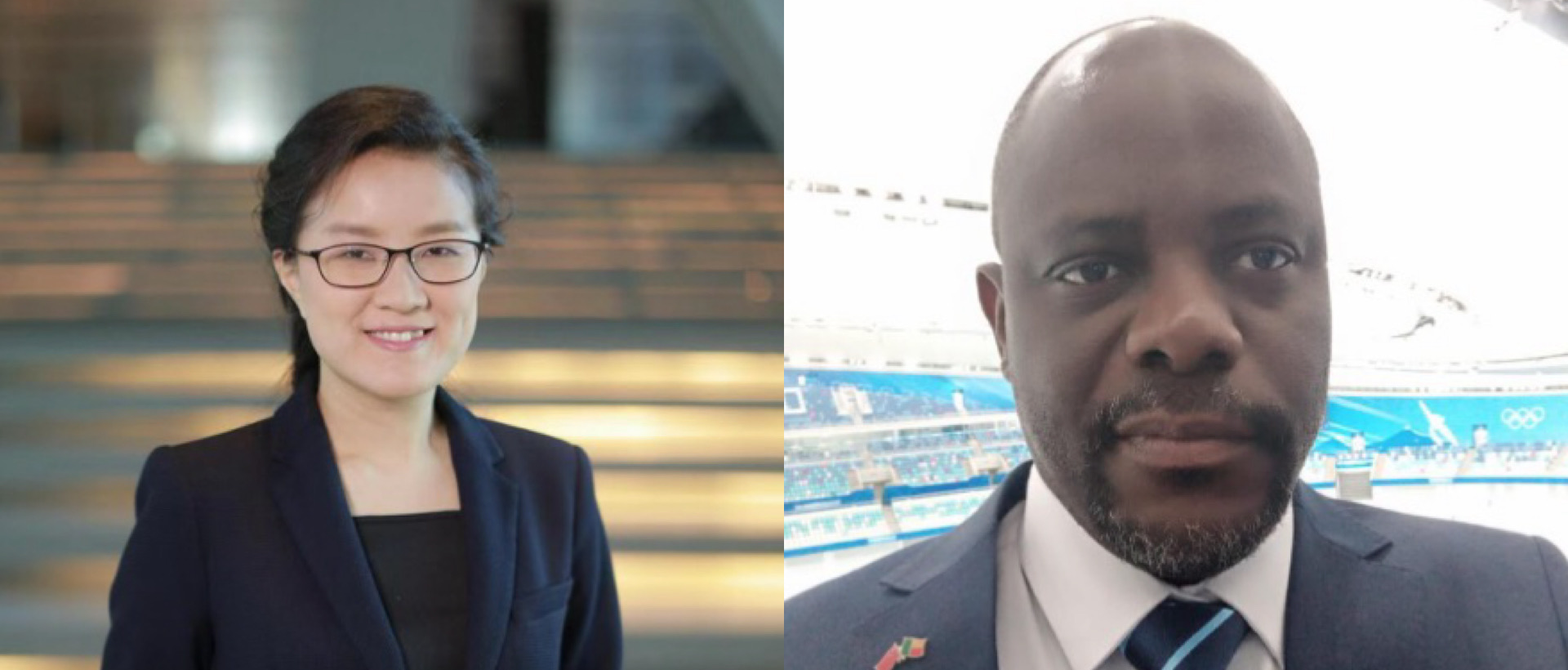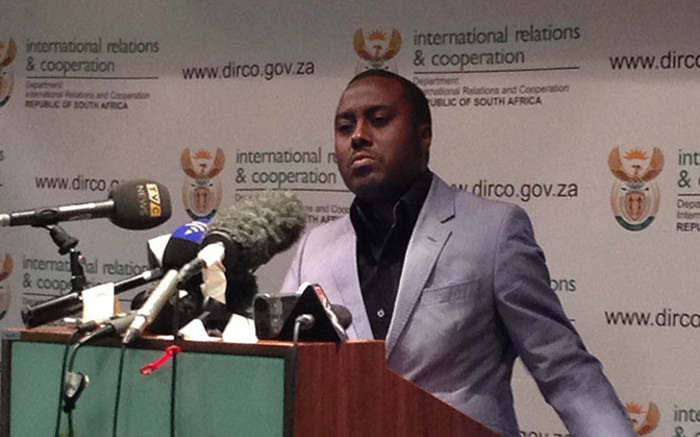
Foreign Ministry Spokesperson Lin Jian
CCTV: This year marks the 10th anniversary of President Xi Jinping’s proposition of building a China-LAC community with a shared future. How does China view its progress and what’s China’s expectation for China-LAC relations in the years ahead?
Lin Jian: Ten years ago on July 17, 2014, President Xi Jinping attended the China-Latin American and Caribbean (LAC) Countries Leaders’ Meeting in Brasilia and delivered a keynote speech entitled “Build a Community of Shared Destiny for Common Progress.” In the speech, President Xi for the first time made the proposition of building a China-LAC community with a shared future, which pointed the way forward for China-LAC relations in the new era and was warmly received among LAC countries. Over the past decade, thanks to the joint efforts of both sides, continuous progress has been made in building a China-LAC community with a shared future and the China-LAC relationship has ushered in a new era characterized by equality, mutual benefit, innovation, openness and more benefits for the people.
Political mutual trust has been strengthened. President Xi Jinping visited the LAC region five times, received leaders of many countries in the region and had meetings with them on bilateral and multilateral occasions to pool strategic consensus. Practical cooperation has been deepened. China has signed Belt and Road cooperation MOUs with 22 LAC countries. Annual trade volume between China and LAC countries amounts to nearly US$ 500 billion. China is the second largest trading partner for Latin America and the biggest trading partner for countries, including Brazil, Chile and Peru. People-to-people and cultural exchanges have flourished. Various flagship events were held, including the China-LAC Cultural Exchange Year and the “Bridge to the Future” China-LAC Young Leadership Training Program, and projects such as the Confucius Institute and the Luban Workshop were implemented, gaining immense popularity for such cultural exchange and mutual learning activities. The China-CELAC Forum has made steady progress. Under the China-CELAC Forum, a total of over 90 events that cover 28 fields were held, including three ministerial meetings. Next year will mark the 10th anniversary of the official launch of the China-CELAC Forum. The two sides are in close communication on holding commemorative events. The two sides have worked closely with each other on international coordination. China and LAC countries are committed to true multilateralism and have maintained sound communication and collaboration on global issues. The Common Understandings on Political Settlement of the Ukraine Crisis jointly issued by China and Brazil not long ago received active support and response from over 100 countries and sends out the strong message of upholding peace, fairness, justice, and win-win cooperation from China and LAC countries.

This year and next year, the G20 Summit, the APEC Economic Leaders’ Meeting, the BRICS Summit and the Conference of the Parties of the UNFCCC will be held in Latin America. We can anticipate shining “LAC moments” of global governance. The spotlight will once again be on LAC, which also means important opportunities for the growth of China-LAC relationship.
China and LAC countries are developing countries and members of the Global South. China will continue to follow the principle of sincerity, real results, amity and good faith and the principle of pursuing the greater good and shared interests, enhance solidarity and cooperation with LAC countries and work together to advance the Global Development Initiative, the Global Security Initiative and the Global Civilization Initiative, further synergize high-quality Belt and Road cooperation with the development strategies of LAC countries, promote steady progress in building a China-LAC community with a shared future, and usher in another promising decade for China-LAC relations.
Reuters: Former US President Donald Trump has given an interview, in which he said Taiwan should pay for its defense. Would the Foreign Ministry like to comment?
Lin Jian: Let me reiterate once again that the Taiwan question is purely China’s internal affair and brooks no external interference. We are opposed to making China an issue in US elections.
RIA Novosti: The Hungarian Prime Minister’s Political Director in an interview said that Hungarian Prime Minister Viktor Orbán sent a plan on settling the Ukraine issue to EU leaders. Did China receive Prime Minister Orbán’s plan?
Lin Jian: Yesterday, Foreign Minister Wang Yi took a call from Hungarian Foreign Minister Peter Szijjarto to hear Hungary’s views on the Ukraine crisis and its recent effort for peace. China commends Hungary’s constructive mediating role for peace. We stand ready to work with Hungary to bolster the force for peace and steer the situation toward a political settlement.

Beijing Daily: The US State Department spokesperson issued a statement saying that the US continues to promote accountability in defense of human rights in China and that the State Department is taking steps to impose visa restrictions on Chinese officials for their involvement in repression of marginalized religious and ethnic communities. What’s China’s comment?
Lin Jian: The US again uses disinformation to smear the human rights conditions in China and abuses visa restrictions on Chinese officials. Such a move constitutes serious interference in China’s internal affairs and violation of international law and basic norms governing international relations. China strongly deplores and firmly opposes it and has lodged a serious protest with the US. As a countermeasure, China will, in accordance with the law, adopt reciprocal visa restrictions on the US officials who concocted lies, pushed for sanctions against China and undermined China’s interests in the name of human rights issues.
Earlier this month, the UN Human Rights Council adopted unanimously China’s report on the fourth cycle of the Universal Periodic Review, which fully shows that the international community highly recognizes China’s achievement in protecting human rights. The US has no right and is in no position to point fingers at other countries’ human rights condition. The international community has long watched and detested how the US manipulates human rights issues. If the US truly cares about human rights, it should abandon double standard, take a hard look in the mirror, reflect on its own human rights violations, and deal with the mounting human rights issues within the US itself, instead of interfering in other countries’ domestic affairs and sanctioning them in the name of human rights.
Bloomberg: The US is considering using even more strict measures that would put pressure on companies in countries like Japan and the Netherlands to restrict chip trade with China. Does the Foreign Ministry have any comments?
Lin Jian: China made clear its position more than once on the US’s malicious attempts to block and suppress China’s semiconductor industry. The US overstretches the concept of national security, politicizes trade and tech issues and uses them as weapons to tighten control over chip export to China and coerce other countries to go after China’s semiconductor industry, which severely undermines international trade rules, destabilizes global industrial and supply chains, and serves no one’s interests. China firmly opposes it. We hope relevant countries will do the right thing, firmly resist coercion, and jointly uphold a fair and open international trade order to protect their own long-term interests.
Reuters: We understand that a recently signed agreement between China and the Philippines will open a direct line of communication between both countries’ leaders’ offices to help prevent confrontations in the South China Sea from spiraling out of control. Would the Foreign Ministry like to comment?
Lin Jian: China is always committed to properly handling maritime issues with the Philippines through dialogue and consultation. At the ninth meeting of the China-Philippines Bilateral Consultation Mechanism on the South China Sea held earlier this month, the two sides talked about improving the maritime communication mechanism between the two countries. China and the Philippines agreed to further enhance communication and dialogue between diplomatic and coast guard agencies, so as to jointly keep the maritime situation and the overall bilateral relationship stable.

Dragon TV: We noticed that there has been growing interest in China recently in the international tourism market. The number of flights to China and hotel searching and booking volume have seen a significant increase compared with last year. According to some international tourism agencies, recent demand for China travel among foreign tourists is more than four times that of last year. Many foreign vloggers who have been to China are posting their shop hop videos on social media. “China Travel” has become a hot trend. Do you have any comment on this?
Lin Jian: I’m glad to see more and more foreign friends visit and explore China. I myself have seen quite a few video clips taken by foreign friends strolling in Chinese cities and towns, visiting parks, tasting local delicacies, taking boat tours and enjoying folk custom performances, which seem to have become quite trendy for foreign tourists in China. The videos they shared about unique experiences in China, such as learning square dancing, exploring tasty food in night markets, taking photos with giant pandas and riding driverless taxis, have gained millions of likes from foreign viewers.
I believe you have noticed our new facilitation measures for cross-border travel. We have rolled out a 15-day visa-free entry policy for 15 countries, including France, on a trial basis, and expanded the coverage of our 144-hour visa-free transit policy to 37 ports of entry. We now allow visa-free entry for all foreign tourist groups traveling by cruise ship, and have improved mobile payment, ticket purchase at scenic spots and other supporting services. These measures have made foreigners’ traveling, working and living in China easier and allowed them to fully experience the charm of China as they ride the new trend of “China Travel.”
We welcome more foreign friends to visit as many Chinese cities and scenic spots as possible to experience a more open and beautiful China and share their first-hand experience with the rest of the world. Hope more people will come and unlock their own unique “China Travel” experience.
China News Service: In November 2023, China and the US held consultations on arms control and non-proliferation in Washington DC. During the past few weeks, some US senior official accused China of declining a new round of consultations with the US and not providing a substantive response to the suggestions that the US put forward. What’s China’s comment?
Lin Jian: Over the past weeks and months, despite China’s firm opposition and repeated protest, the US has continued to sell arms to Taiwan and done things that severely undermine China’s core interests and the mutual trust between China and the US. This has seriously compromised the political atmosphere for continuing the arms control consultations. Consequently, the Chinese side has decided to hold off discussion with the US on a new round of consultations on arms control and non-proliferation. The responsibility fully lies with the US.
China stands ready to maintain communication with the US on international arms control in line with the principles of mutual respect, peaceful coexistence and win-win cooperation, but the US must respect China’s core interests and create necessary conditions for dialogue and exchange.
NHK: From today to next week, several Japanese political figures will visit China and plan to carry out exchanges with China at various levels. What is your comment on this development between China and Japan?
Lin Jian: China attaches importance to having exchanges and interactions with Japan at various levels and hopes such exchanges will contribute to the improvement and growth of China-Japan relations.









